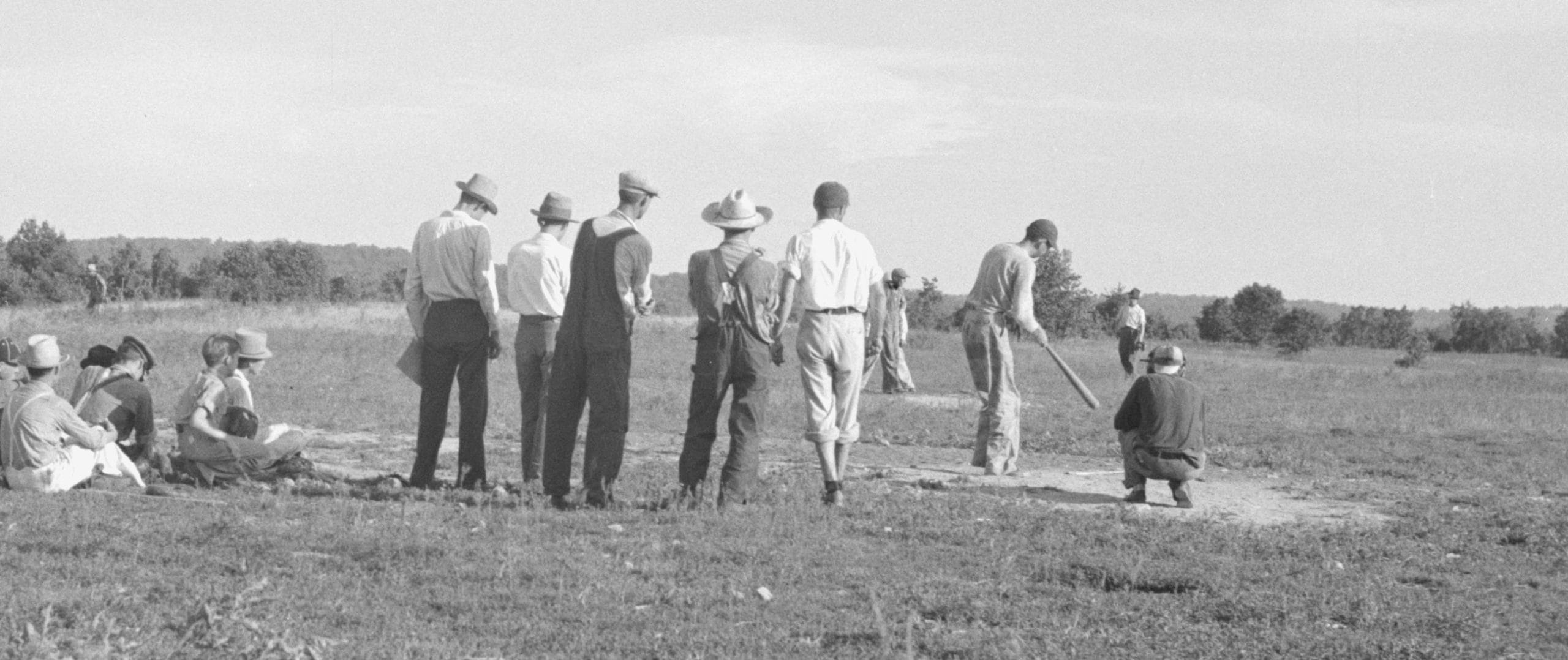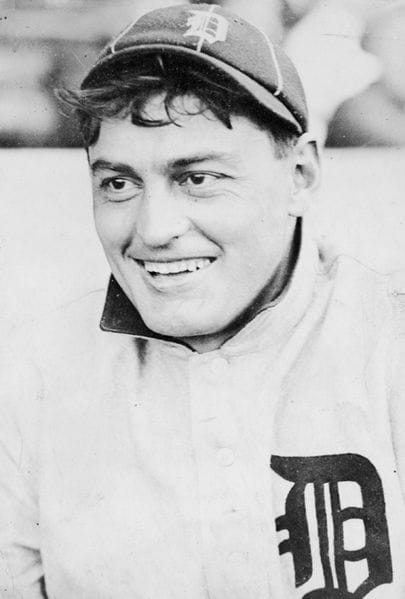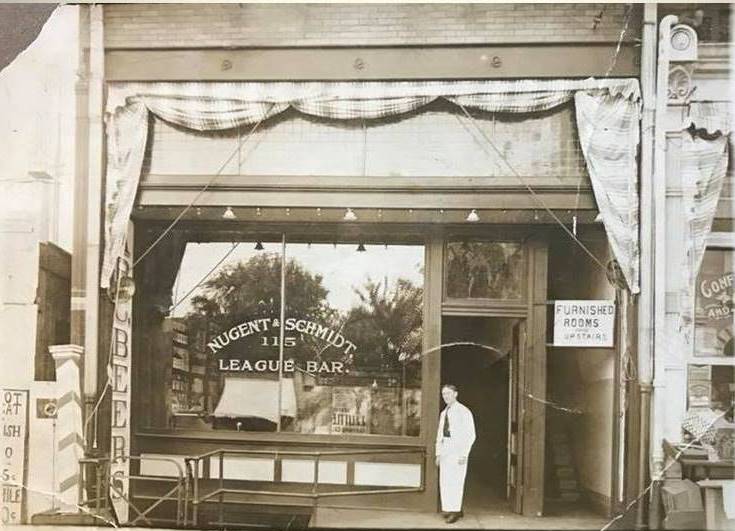

Uh oh...
It appears that you're using a severely outdated version of Safari on Windows. Many features won't work correctly, and functionality can't be guaranteed. Please try viewing this website in Edge, Mozilla, Chrome, or another modern browser. Sorry for any inconvenience this may have caused!
Read More about this safari issue.
FSA/8b33000/8b330008b33014a.tif

On the afternoon of Sunday, March 22, 1970, a typically chilly March wind blew across St. Mary’s Cemetery just north of Altus, Arkansas. A few mourners braved the uncomfortable wind and low 50’s temperatures to pay their respects to Arkansas’s first major league baseball star.
Actually, Charles “Boss” Schmidt had died over 37 years earlier, but his grave had been left unmarked since his death. On this March day, family, friends, and local dignitaries gathered to commemorate the placing of a gravestone provided by the Detroit Tigers. Arkansas native and Baseball Hall of Famer George Kell represented the Tigers at the ceremony. In addition to the name “Charles Schmidt” and his birth and death dates, the marker read, “A Detroit Tiger 1906 – 1911.”

Schmidt was born in London, Arkansas on Sept. 12, 1880, and grew up in Coal Hill, in the heart of the Arkansas coal belt. Schmidt, one of the strongest and toughest of the young coal workers, earned the nickname “Boss” from fellow miners. His physical strength and toughness would serve him well in baseball, where his reputation as the consummate gritty backstop followed him his entire career.
Schmidt appeared in his first professional game for the Little Rock Travelers in August of 1901, without coming to bat. That inauspicious beginning was followed by four successful minor league seasons and a promotion to the American League Detroit Tigers in 1906.
“I like to do just four things. Play ball, fight, hunt and eat. Boxing is all right for a little amusement when it’s too cold to play ball…” Boss Schmidt
Charles “Boss” Schmidt
Defensively, Schmidt was more courageous than adroit. Armed with the tools of the day, a rudimentary mask, thin chest protector, and a mitt that resembled a throw pillow more than a glove, Schmidt often defended the position rather than manning it. With no shin guards and numerous broken fingers, he was often injured, but seldom unavailable to play.
Boss Schmidt spent six seasons with the Detroit Tigers from 1906 through 1911. In three of those seasons, 1907, 1908, and 1909, he was the Tigers’ regular catcher. He led the league in errors by a catcher in each of those years. Never known as a good hitter, his major league batting average was a lackluster .243. While Schmidt’s statistical record does not reflect a noteworthy career, he is one of the most renowned major leaguers of his time.
Schmidt’s early claim to Tiger fame was his willingness to physically put the abrasive Ty Cobb in his place, a job his teammates felt needed to be done often. The most famous of these confrontations resulted when Schmidt intervened after Cobb attacked an African-American groundskeeper and his wife. Although Schmidt reportedly gave Cobb a “good plummeting,” he had to administer the same lesson just two weeks later.
In addition to his very public and well-documented fisticuffs with Cobb, tales of Schmidt’s toughness and strength became legendary. In a time when baseball fans depended on sportswriters to help them get to know the players, reports of Boss Schmidt’s exploits, both accurate and fabricated, made good stories.
Did Schmidt allow pitchers to throw their best fastball at him while he stood and deflected it with his body?
He probably did. The price for an opportunity to throw at Schmidt was apparently $10 and he could always use the money.
Did he stand with his back 2 inches from the wall and challenge teammates to hit him in the stomach hard enough to drive his back to the wall?
This particular stunt is documented often in newspaper accounts.
Did he fight heavyweight Champion Joe Johnson in a boxing match?
Although some accounts amend this story to say he was Johnson’s sparring partner, this story is very dubious. He did fancy himself a boxer and he did have a number of professional fights. Most of these boxing matches were against less than quality opponents and took place in Fort Smith where he was sure to draw a crowd.
Did he really dismiss the idea of shin guards as unnecessary and unmanly catcher-wear, worn only by sissies?
Yes, when shin guards became a standard part of a catcher’s equipment, Schmidt continued to deflect low pitches with his shins. Could Schmidt actually drive nails with his fists? Apparently, this was one of his favorite tricks, and he especially enjoyed proving this boast when ladies were present.
Regardless of their accuracy, reports of Schmidt’s feats of strength and toughness are not unlike Yogi Berra quotes. Some are true, some are questionable, but the tales are as essential to his legacy as his exploits as a baseball player.
Perhaps Schmidt’s most significant contribution to the culture of American sports was ignored until discovered by accident. Conway attorney Brad Williams was doing family research when he discovered that his great-great uncle, P. M. Nugent, had opened a bar in Fort Smith in partnership with a major league baseball player. That player was Charles Boss Schmidt. The Nugent and Schmidt League Bar which opened on Garrison Avenue somewhere around 1909, was very possibly America’s first celebrity sports bar.

Courtesy of Wanda Kirk Vandiver and Brad J. Williams.
After six seasons in Detroit, Boss Schmidt remained in minor league baseball for fifteen more years, often as a player-manager. His last job was a short stint as manager of the Kalamazoo Celery Pickers in 1926.
The last years of Schmidt’s life were spent struggling to make a life after baseball. He picked up odd jobs around baseball, but eventually returned to Arkansas without his wife and children and lived alone near Coal Hill. On Sunday, Nov. 13, 1932, Schmidt went to a local physician’s home in intense pain suffering from an intestinal obstruction. He died a day later.
Join the Conversation
Leave a Comment
2 responses to “Backroads and Ballplayers – Boss Schmidt from Coal Hill”
 Leave a Reply
Leave a Reply
We do the work.
You check your email.
Sign up for our weekly e-news.
Get stories sent straight to your inbox!











 Leave a Reply
Leave a Reply
[…] partly due to shabby catcher equipment, partly due to fighting and, well, partly due to one of his favorite parlor tricks: hammering nails into floorboards with his fists to impress […]
[…] partly due to shabby catcher equipment, partly due to fighting and, well, partly due to one of his favorite parlor tricks: hammering nails into floorboards with his fists to impress […]